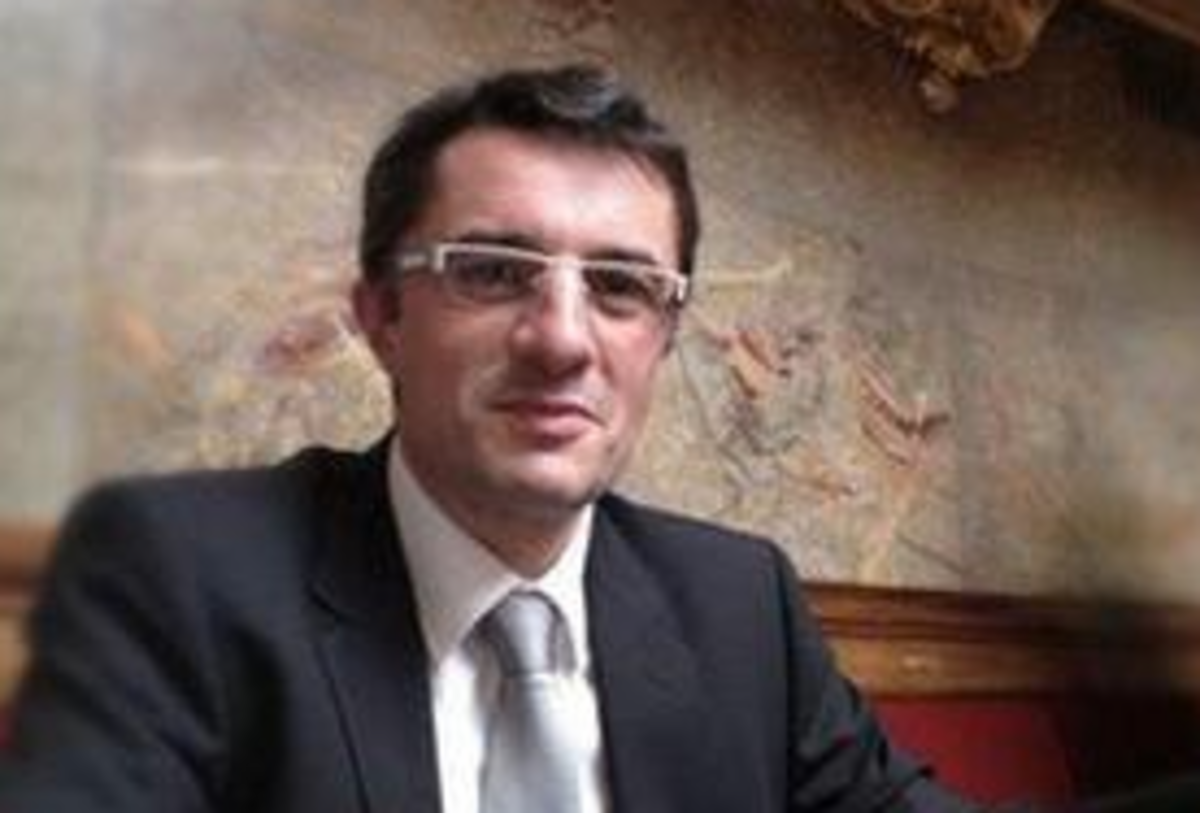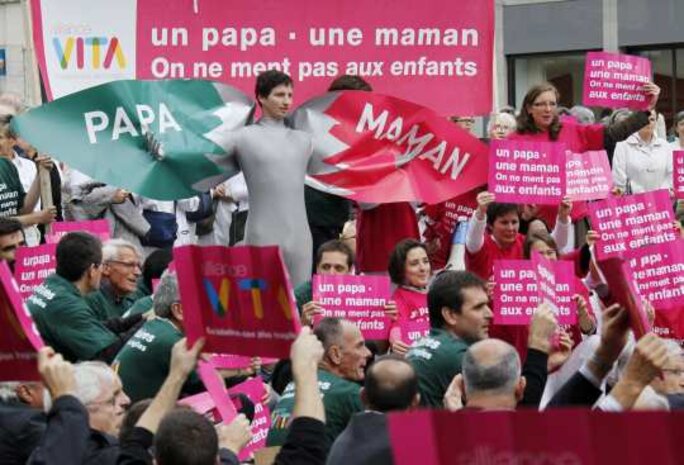This week, the French government approved the text of a bill of law to go before parliament that will give full-blown marriage and child adoption rights to couples of the same sex.
The bill is one of President François Hollande’s election campaign pledges, and will be debated in parliament in January next year. It is bitterly opposed by the conservative opposition and France’s Roman Catholic Church, whose leaders have led a high-profile campaign against it, calling on followers to lobby their MPs to vote against the text. The leading opposition party, the UMP, has meanwhile promised to reverse the legislation if it is carried, and a significant number of French mayors have warned they will refuse to marry same-sex couples.
A series of public parliamentary hearings began today to prepare the ground for debates, in which a wide cross-section of opinion will be heard, including that of sociologists, psychologists, representatives of gay rights associations, church officials and representatives of foreign governments where same-sex marriage has been legalized.
While the bill, judging by the results of opinion poll surveys, to meet with approval from a majority of the French public, the controversy surrounding is illustrated by a degree of division apparent among Hollande’s left-wing majority.

The bill will be presented before parliament by Erwann Binet, 40, Socialist Party Member of Parliament for the Isère département. In this interview with Mathieu Magnaudeix, he argues why the proposed law is an important step forward, as a principle of the equality of rights for all, and why he is confident it will be enacted, with or without the cooperation of mayors.
-------------------------
Mediapart: There are 12,000 mayors across France who have announced that they will not marry couples of the same sex. What’s your answer to that, for example should there be disciplinary measures taken against them?
Erwann Binet: Mayors won’t have the choice. The debate can be had, elected representatives can give their vision of society, we can all have an opinion. But as an officer of public records, they [the mayors] will have no choice, they will have marry those people who present themselves before them and who meet the necessary requirements. They have no margin for manouevre, they must marry people as the law requires. As for disciplinary measures, we’re not there yet. I have no doubts about the fact that there will not be refusals to celebrate marriages in municipalities. Some mayors might be bothered by this situation, which, incidentally, I don’t see any reason for, but if this was the case then they can be replaced by one of their deputies. It remains the case that under no circumstances could they refuse to marry people of the same sex.
Mediapart: You were this year elected to the National Assembly for the first time. as a member of the new socialist ruling majority. What does this Bill represent?
E.B.: It is important for the Left. It is always [the Left], and never the Right, that ensures that the law is in tune with current society. The opposition now says that it will reverse the text of the law, that it will ‘un-marry’ homosexual couples. Nobody can believe that, even [ultra-conservative Catholic politician] Christine Boutin says that’s impossible.
Along with giving voting rights to [non-EU] foreign nationals, [the right to] marriage and adoption for everyone are among the issues of society that would not be raised without the Left. So we must advance with this. The Left must give its all to vote through this text. Of course, there are very significant economic questions at the moment, but we can tackle every issue head on. Opponents of the text also argue that it concerns only very few people, that there’s no need [therefore] to legislate. Does that mean we should not have brought in legislation against the death penalty? Over and above the number of people concerned, it is a question of principle and equality of rights.

Mediapart: In 1998, when the Left pushed through parliament the bill for the PACS civil union, a legal status for hetero- and homosexual couples, it lost the vote.
E.B.: Yes, that was properly messed up at the beginning.
Mediapart: Are you not worried that this will be the same story when the bill goes before parliament in early 2013? There are signs of a certain reticence towards it among the ranks of socialist MPs.
E.B.: The reticence you speak of is not something that I notice. Like in the population at large, there are some socialists who have no detailed knowledge of the subject. They have taken on board that society has changed, that the existence of homosexual couples is a reality, that these couples raise children and that the law must accommodate this situation, but they are still trying to be convinced, and are not very clued up on the question of legal filiation rights. Indeed, beyond the question of marriage, the law is precisely to protect the children raised by these couples.
I can see around me some MPs who are making ground here. Some of them who weren’t convinced a few months ago are now. The [parliamentary] debates will allow us to convince [others] on a wider scale, notably on the question of the legal filiation and education of children, and so on.
Mediapart: Is there a majority in parliament to vote through adoption rights for homosexual couples?
E.B.: Yes. Nothing leads me to believe there is not a majority in favour of this bill.
Mediapart: The government’s Bill sticks to the text of President François Hollande’s election campaign manifesto, his ‘pledge 31’. It does not allow for medically-assisted procreation for lesbian couples, either by in vitro fertilization or artificial insemination, nor the recognition of children born to surrogate mothers abroad, among other things. Can the text of the Bill yet be modified or are such issues already excluded?
E.B.: This is technically possible. It is the National Assembly that will amend and vote the text. The Socialist Party parliamentary group has already said it will amend the text on the question of medically-assisted procreation. This would be good concerning medically-assisted procreation of course, but also regarding the status of parents-in-law and the question of the presumption of parenthood. These subjects will be tackled during the debates. Afterwards, will they be dealt with now or as part of a future bill concerning family affairs envisaged by the Prime Minister? I don’t know for certain. As the debates, which will last more than a month, unfold, people can form an opinion of what is desirable and add to the text elements that we could transfer to a future bill.
Mediapart: Quite a few people on the Left believe that the question of medically-assisted procreation can only be properly dealt within the framework of a law on bioethics.
E.B.: It is a mistake to say that access to medically-assisted procreation is a question of bioethics. The technique is indeed a matter for bioethics, because it involves lives. On the other hand, to know who has access to it is not a bioethics issue because today, access to medically-assisted procreation already exists [for heterosexual couples]. The question is therefore a social one. Who has a right to it? Belgium, the Netherlands, Spain and the United Kingdom have already settled this. Now it is for us to do.
-------------------------
English version: Graham Tearse


